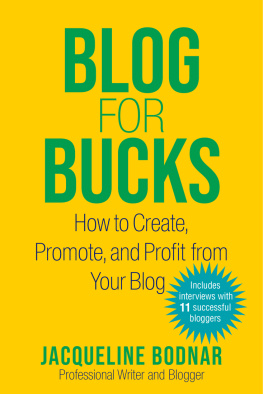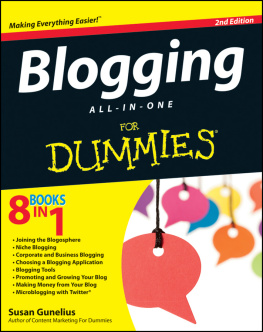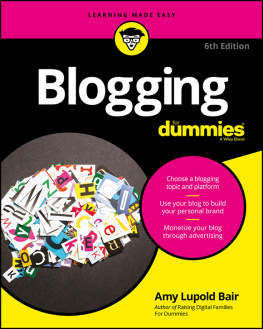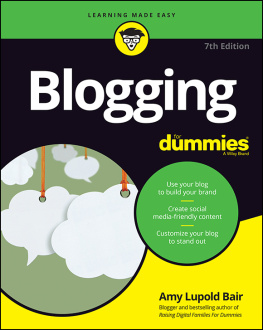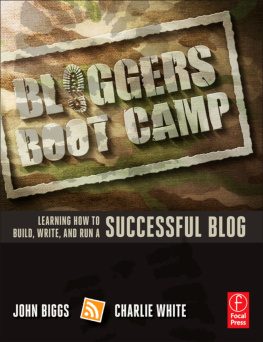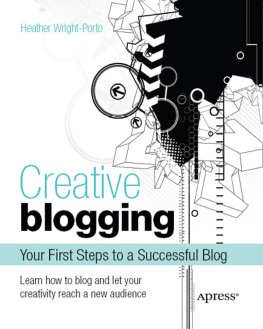
Copyright 2013 by Frances Caballo
No part of this publication may be reproduced, stored in a retrieval system, or transmitted in any form or by any means, electronic, mechanical, photocopying, recording, scanning, or otherwise, except as permitted under Section 107 or 108 of the 1976 United States Copyright Act, without either the prior written permission of the Publisher, or authorization through payment of the appropriate per-copy fee to ACT Communications, P.O. Box 14354, Santa Rosa, CA 95402.
Limit of Liability/Disclaimer of Warranty: While the author has used her best efforts in preparing this book, she makes no representations or warranties with respect to the accuracy or completeness of the contents of this book and specifically disclaims any implied warranties of merchantability or fitness for a particular purpose. The advice and strategies contained herein may not be suitable for your situation. You should consult with a professional where appropriate. The author shall not be liable for any loss of profit or any other commercial damages, including but not limited to special, incidental, consequential, or other damages.
ACT Communications
P.O. Box 14354
Santa Rosa, CA 95402
ISBN: 9781626754713

The function of a blog is on some level to start a conversation that youre not involved in any more because youve already had your say.
Nora Ephron, quoted in Emma Brockets, Everything is Copy,
The Guardian (March 3, 2007)
About the Author
Frances Caballo is a social media trainer, strategist, and author with 23 years of communications experience. Presently, she is the owner of ACT Communications and is the Social Media Editor for three writers organizations: Womens National Book Association-Francisco Chapter , Bay Area Independent Publishers Association , and Redwood Writers , the largest chapter of the California Writers Club .
Frances specializes in social media training for users of all levels; sets up and manages social media accounts for clients; and provides coaching on clients social marketing platforms. Her books include: Social Media Just for Writers: The Best Online Marketing Tips for Selling Your Books , Pinterest Just for Writers, and Blogging Just for Writers.
Chapter 1
Be as Gutsy as Nora Ephron
Are you new to blogging? Are you disappointed by how little traffic your blog generates? Would you like information on how to explore opportunities to join a blogging community? Keep reading. This book endeavors to answer all of your questions to help you attract new fans to your blog while making blogging as easy as possible for you.
What Nora Ephron Taught Us about Blogging and Writing
Nora Ephron was a gutsy, funny, successful, and creative writer. As noted in the Huffington Post following Ephrons death in June 2012, she once told the Wellesley Class of 1996 at their commencement ceremony, Whatever you choose, however many roads you travel, I hope that you choose not to be a lady. I hope you will find some way to break the rules and make a little trouble out there. And I also hope that you will choose to make some of that trouble on behalf of women.
How many commencement speakers encourage graduates to break the rules? Probably not many. Yet that is how Ephron led her own life. She wasnt interested in mimicking someone else; she wanted to be different and distinguish herself. An incredibly creative woman, Ephron was fearless in her honesty and possessed a killer sense of humor. She used her gifts and talent to distinguish herself in the writing world and Hollywood. In many ways, this quote from her screenplay Heartburn epitomizes her life: And then the dreams break into a million tiny pieces. The dream dies. Which leaves you with a choice: you can settle for reality, or you can go off, like a fool, and dream another dream.
If you write historical novels, be the best in your genre. If you focus on rescued animals, do whatever it takes to be the best source for tips on finding and adopting rescued cats and puppies. If you are a food blogger, create your niche in gluten-free, Tuscan, or holiday cooking. Discover your talent, pursue it, and brand it.
To be a great blogger, you must develop your own voice and style, and stick to it. Ephron spiced her posts with insight, pithy humor, and self-reflection. She wasnt afraid to admit what she didnt understand or confess what she didnt believe, despite someones expert opinion. She knew how to help us smile and even chuckle while being informed. Her blog was at times as irreverent as the fake orgasm scene in When Harry Met Sally, and thats why we adored her and loved her blog, screenplays, and books.
Back in the Beginning
In 1999, the word blog began to appear. Yet, in just a matter of a decade, it seemed as though every writer, editor, publisher, and reporter had a blog. Blogs cover a range of topics from book reviews to dog-rearing tips to do-it-yourself instructions on a range of home improvement projects. Some bloggers do extremely well while others limp along. The key to having a successful blog is simple:
Provide the best content you can.
Create content readers want.
Optimize your blog with keywords.
Use social media to alert others of your latest musings.
These four concepts are essential to generating traffic to your blog. While the advice seems simple, maintaining a successful blog is not. Providing stellar content every week for your readers takes a lot of work. It also takes commitment. Then, to convert your blog readers into people who purchase your book takes patience and active engagement.
Dont become discouraged. Despite the hurdles, blogging is a very effective way to be discovered on the Web, to keep your website updated, to improve your search engine ranking, and to help you sell books. It can also be a lot of fun.
Audience, Audience, Audience
A marketers first question to you will be: Who is your audience? Whom are you writing for? A common mistake writers make is to write for other writersfor colleagues who encourage them, root for them, and share their experiences, frustrations and successes. Instead, successful bloggers such as Trish Collins, co-owner of TLC Blog Tours, suggests that you write for your readers and prospective fans. As you type those first few words, think of the people who buy your books or who look to your poetry for inspiration. Sometimes it works best to think about your most ardent blog follower. What would that person want to read next? Does that reader want to be entertained or informed? Always write for your readers.
Tease Readers with Keyword-Rich Blog Titles
Blog titles need to attract attention, have zing, and appeal to a readers curiosity. Think about the teasers at the top of newspapers. Their purpose is to entice you to drop some coins into newspaper racks and read the stories below the fold and on the newspapers internal pages. The next time you write a title for your blog, try to write teaser copy. Use words that will lure your readers in.
Use Google Adwords to find keywords particular to your niche, and use them in your title and in the post. Use long-tailed keywords, terms that include two or more words that are unique. For example, if you were to type social media into your favorite search engine, you would see hundreds of thousands of pages of results. However, if you were to type social media for mortgage lenders, the results would narrow.
Use numbers in your blog title. People are more likely to click on a title if it contains numbersespeciallyoddnumbers.Wouldyoubeabletoresistablogwiththistitle:5WaystoMasterFacebook? Isnt it tempting to click on that link to find out how you can master Facebook in just five steps?
Next page


